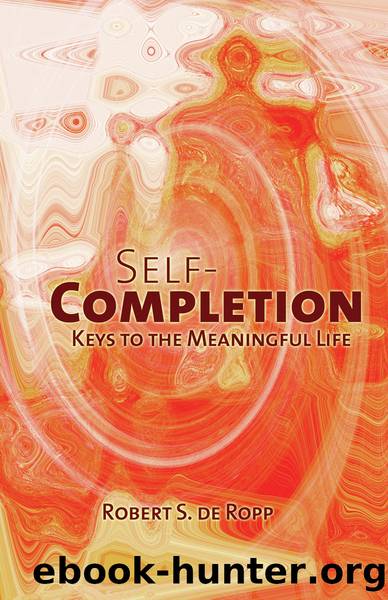Self-Completion by Robert S. de Ropp

Author:Robert S. de Ropp
Language: eng
Format: epub
Publisher: Gateways Books & Tapes
Published: 2002-01-15T00:00:00+00:00
Trap #6. The Super-effort Syndrome.
This subtle trap can also be called the Climb-Mount-Everest Syndrome. It consists in the belief that the Work involves some frightfully intense super-effort analogous to the effort made by a mountaineer who struggles to climb Mount Everest single handed.
The trap is subtle because the idea behind it is close to the truth. The Work does involve great effort, but it is a very special kind of effort. This effort involves the maintenance of balance and awareness. It is more like the skill of a ropewalker or a juggler than the sort of heroic teeth-clenching efforts involved in feats of derring-do such as climbing Mount Everest.
Underlying the Super-effort Syndrome is a deeply rooted misunderstanding about the nature of the Work. The real Work consists of a struggle against the state of identification. Identification means becoming totally immersed in what one is doing and in losing all objective awareness of oneâs own existence. Many people pass their entire lives in this state, and our culture is designed to ensure its continuance. We are encouraged at all times to become identified with something, with a dream, a project, a belief, a game, an ambition, a craving. We are so accustomed to being identified that we can hardly believe that it is possible to live in any other way.
It is quite possible for people to become identified with what they imagine to be the Work. This causes them to approach the Work in a grim and earnest spirit. They think they must demand of themselves not ordinary efforts but super-efforts. They do not understand that the Work is a game of skill to be played lightly in a spirit of detachment. For them, the Work turns into a sort of ordeal.
This grim attitude produces feelings of tension and discomfort. Any failure to persist in super-efforts produces a sense of guilt. The guilt feelings generate those patterns of self-punishment that have been and still are so unpleasant a feature of the lives of certain kinds of religious fanatics.
These fanatics punish themselves by such procedures as wearing hair shirts, fasting, practicing sexual abstinence, wearing chains, not sleeping, self-flagellation and so on. They often develop a pernicious habit of punishing others who happen not to agree with their religious beliefs. It was such punitive excesses that moved the Roman poet to exclaim, âTantum religio potuit suadere malorumâ, (so great is the evil that religion is able to arouse).
The Super-effort Syndrome produces another more subtle effect. Organizers of the Work, who often get caught in this trap, will set aside a period of time to be devoted to super-effort. Everything is planned to make life during this time as difficult and unpleasant as possible. There are interminable readings from various sacred books, intensive spells of hard manual labor, special exercises supposed to promote self-remembering. There may be very little food, not much sleep, no heating in winter, harsh conditions generally. An attitude of grim determination prevails. Do or die. Conquer or perish.
It is possible for those who understand what they are doing to gain something from these endurance tests.
Download
This site does not store any files on its server. We only index and link to content provided by other sites. Please contact the content providers to delete copyright contents if any and email us, we'll remove relevant links or contents immediately.
| Deconstruction | Existentialism |
| Humanism | Phenomenology |
| Pragmatism | Rationalism |
| Structuralism | Transcendentalism |
| Utilitarianism |
The remains of the day by Kazuo Ishiguro(8947)
Tools of Titans by Timothy Ferriss(8346)
Giovanni's Room by James Baldwin(7301)
The Black Swan by Nassim Nicholas Taleb(7086)
Inner Engineering: A Yogi's Guide to Joy by Sadhguru(6776)
The Way of Zen by Alan W. Watts(6575)
Asking the Right Questions: A Guide to Critical Thinking by M. Neil Browne & Stuart M. Keeley(5741)
The Power of Now: A Guide to Spiritual Enlightenment by Eckhart Tolle(5725)
The Six Wives Of Henry VIII (WOMEN IN HISTORY) by Fraser Antonia(5486)
Astrophysics for People in a Hurry by Neil DeGrasse Tyson(5169)
Housekeeping by Marilynne Robinson(4420)
12 Rules for Life by Jordan B. Peterson(4292)
Double Down (Diary of a Wimpy Kid Book 11) by Jeff Kinney(4252)
The Ethical Slut by Janet W. Hardy(4232)
Skin in the Game by Nassim Nicholas Taleb(4223)
Ikigai by Héctor García & Francesc Miralles(4219)
The Art of Happiness by The Dalai Lama(4116)
Skin in the Game: Hidden Asymmetries in Daily Life by Nassim Nicholas Taleb(3973)
Walking by Henry David Thoreau(3939)
